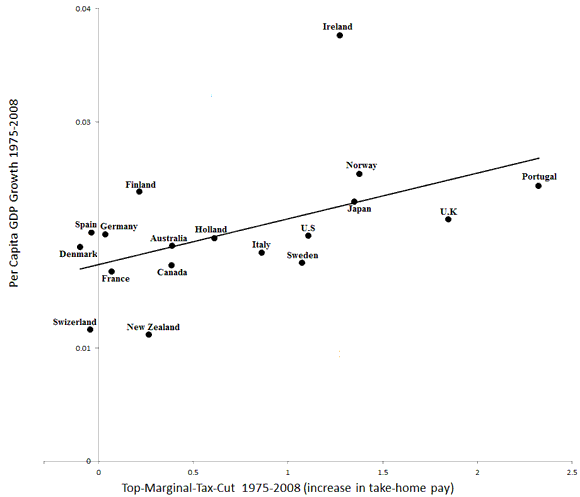Because many academic economists are partisan Democrat, and because Democrats want to raise taxes on the rich, there is a push by economists to claim taxes in practice doesn’t harm output.
There is no consensus regarding the importance of taxes. Macroeconomist who study countries generally believe taxes are quite harmful, while micro-economists who study individuals typically find that taxes are only moderately harmful.
The standard micro study compares changes in behavior after a tax-reform, e.g comparing the behavior of those who got larger tax cuts with those who got smaller ones. There are problems with this method.
1. You have large measurement error/random chance whenever measuring income, which might make it harder to detect true response. I think this problem is worse for individual-level than country-level analysis, since for countries randomness gets evened out by aggregating.
2. Adjustment cost and time lags are important. People don’t just quit their job if you raise their tax rate by a couple of percentage points (often temporarily); as such decisions are made based on long term consideration. Raj Chetty addressed adjustment costs, finding much larger negative effects of taxes on income and hours worked.
3. Taxes on others affect you. For instance, firms and unions will set the standard workweek in a plant for everyone in part based on average taxes, not just yours. Another example is that if low-income workers are highly taxed, the rich will be less likely to specialize by buying domestic services and working more. The standard micro-model doesn’t detect the multiplier effect of taxes in these examples, since it can only compare individuals with each other, missing group-level effects.
4. The straw-man account of how taxes influence behavior are the most amusing. Obviously humans are not robots who maximize each decision with perfect knowledge. But even with bounded-rationality, incentives affect human behavior. This can for example be through rough rules-of-thumb, observing others around you, change of norms regulating work-ethic, or information imbedded in culture and tradition.
In a society with weakened incentives for work, a part of the population will eventually take the hint and work less, even if they don’t go around calculating the exact marginal tax rate using excel-sheets. This kind of aggregate level dynamic wherein the welfare states gradually changes society is impossible to detect using the standard methodology in public finance.
Note that this point doesn’t only apply to taxes, but to all economic behavior. Economists arguing that taxes do not influence behavior since people are not perfectly rational are being inconsistent when they go to their micro-class and teach their students that the price of apples clears the apple market.
5. Another illogical but common argument is the incremental fallacy, related to Zeno’s paradoxes: “ha ha, it is silly to think that a tax increase of 1% changes anyone’s behavior”. By this reasoning any price hike that is done in tiny incremental steps has no effect, regardless of the total magnitude of the ultimate increase!
You can easily make the same flawed reasoning about selling a car. Just raise the price in 1 dollar increments, and you can double the price without losing sales, because no one cares about an extra 1 dollar when buying a car, right?
For these reasons and more, it may be that the standard micro-studies underestimate the harmful effect of taxes. Macro studies that compare taxes, output and hours worked over time between countries find stronger effect, though obviously that method has its own problems.
Liberal economists Pickety and Saez are noted advocates for raising marginal taxes. They have created another valuable dataset of top marginal tax for 18 countries from 1975. Ironically, their own cross-country-cross-time data contradict the notion that taxes are irrelevant.
This is a graph of changes in the top marginal tax rate 1975-2008, combined with growth in per capita income from the OECD. Countries that cut taxes more had higher growth. The p-value is 0.033, so the correlation is statistically significant.

Its dangerous to interpret cross-country correlations as causality, so the graph should be interpreted with caution. It may be that growth causes tax cuts or that tax cuts correlate with generally improved economic policy driving growth. The correlation hardly singlehandedly proves taxes matter, but as part of a wider set of evidence it is interesting.
P.S
The way tax-cuts are measured is the percentage increase in take-home pay (e.g For Sweden, the top marginal tax rate declined from 87% to 74%. Take-home pay per dollar earned increased from 0.13 to 0.26, an improved inventive to work of roughly 100%). If you instead measure raw tax-cuts, so 13 percentage points in the Sweden-example, you get roughly the same graph, with a p-value of 0.058.



Leave a Reply